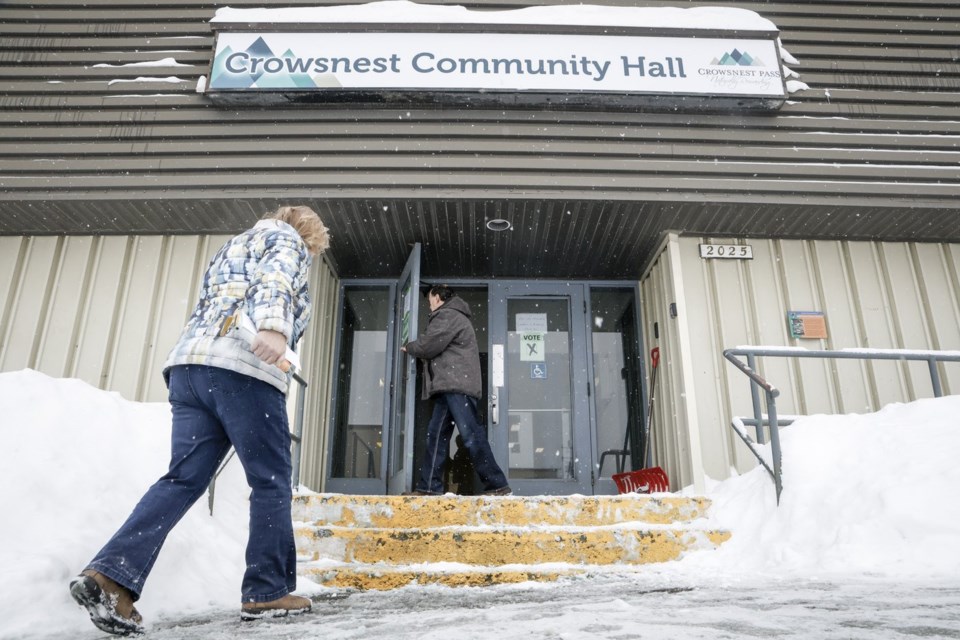CROWSNEST PASS, Alta. — Heavy snow didn't stop a steady stream of voters in Crowsnest Pass from casting ballots Monday in favour of bringing King Coal back to this scenic rocky patch of Alberta’s southwest.
The issue has polarized debate, but signs visible on the way to voting in the community hall were clear: I (love) Crowsnest Coal, said one. We are a Coal Town, said another.
A third was more succinct: Vote Yes to Grassy Mountain.
In the end 72 per cent of the vote was in favour of the new project. There was a 53.6 per cent turnout of eligible voters compared to just 38.5 per cent in the last civic election.
More than 40 years after coal mining ended in the Crowsnest Pass, the municipality is asking the 6,000 residents to say yes or no to a straightforward question: “Do you support the development and operations of the metallurgical coal mine at Grassy Mountain?”
"The Crowsnest Pass has made a decisive decision and as mayor and council we will take your position forward to the upper levels of government and through the regulatory process," Crowsnest Pass Mayor Blair Painter told The Canadian Press late Monday evening.
"This vote was about hearing from and getting direction from our electorate. It is about hearing from the people living here and finding out once and for all, without all the other outside voices, what the people of this community want."
The result won't be binding or have any influence on regulatory or legal challenges. It's another factor in the heated debate of economy versus environment.
"It's because this is a divisive issue that it is so important to know where our community stands and you have spoken.
One of the voters at the community hall was Steve Arbuckle, whose grandparents were miners and lived in Coleman, one of the communities that make up Crowsnest Pass.
"I know coal," he said as he left the hall.
The economy, he said, needs a boost. "It could sure use something," he said. "Taxes are crazy for a person who owns a home."
Tony Vastenhout, who grew up in Crowsnest Pass, said he's nearing 70 and remembers that when there were coal mines, there were jobs.
"There were a lot of opportunities then and there are none for our kids now," he said. "I hope the vote goes yes.”
Australia-based mining company Northback said it wants to develop the Grassy Mountain coal project at a site that was mined over 60 years ago but never properly restored. It says it would be reclaimed throughout the duration of the project.
Northback says metallurgical coal, which is used to make steel, is a basic building block for any economy, but opponents worry about the effects on downstream drinking water and the broader ecosystem.
The issue is still before Alberta’s energy regulator and opponents are also challenging the project through the courts.
David Thomas, the communications co-ordinator with Crowsnest Headwaters – which is leading the no campaign -- said the issue has divided the community.
He said the loss means it will be easier to raise the alarm about water use to other communities downstream in the province.
"Our plan is to take the story to the downstream municipalities and the irrigation districts in Alberta."
David McIntyre and his wife, Monica Field -- both former managers of the Frank Slide Interpretive Centre -- have been vocal opponents to development in the area.
McIntyre, who lives about 10 kilometres downwind of the proposed mine, is worried about the noise and carcinogenic particles that would come with it.
He said they were told they are just outside the municipal boundary and are unable to vote. He said there are hundreds more that moved in during the "post-coal era" who are also on the outside looking in.
McIntyre said if the mine does go ahead, it won't mean long-term prosperity for the area.
"If it's a go, it won't be the future of the Pass," he said.
"It will be the short-term future of the Pass but won't impact its long-term worth."
This report by The Canadian Press was first published Nov. 25, 2024.
Bill Graveland, The Canadian Press




